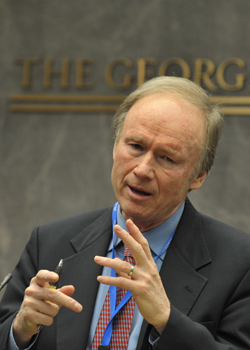 By Edward Lee
By Edward Lee
The Supreme Court granted cert today in Golan v. Holder. The case involves a peculiar “copyright restoration” provision enacted by Congress in 1994 as a part of the Uruguay Round Agreements Acts (URAA), which was intended to implement the U.S. obligations under the WTO Agreements. The copyright restoration provision–codified at 104A and 109(a) of the Copyright Act–grants new copyrights to many old foreign works–at least 50,000 in number–that had been in the public domain in the United States, potentially dating back for decades. Many of the works recopyrighted in 1994 were important works of music, film, and art, including works of Stravinsky, Shostakovich, Prokofiev, Hitchcock, and Picasso. The effect of the law is that many artists, educators, and businesses–like lead plaintiff Lawrence Golan, a professor and conductor at Denver University–have had to stop using the formerly public domain works because use of the works under copyright is now cost-prohibitive. And, in the process, students and members of the public have lost the opportunity to learn and enjoy many works of great cultural importance. By recopyrighting Prokofiev’s Peter and the Wolf, for example, generations of our children no longer hear its performance because copyright has put the music out of reach to most orchestras.
The two questions the Court will consider:
(1) Does the Progress Clause of the United States Constitution, Article I, § 8, cl. 8, prohibit Congress from taking works out of the public domain?
(2) Does Section 514 of the Uruguay Round Agreements Act violate the First Amendment of the United States Constitution?
I started this case 10 years ago when I was working with Larry Lessig at the Stanford Center for Internet & Society, although I have long since turned over the supervising role to other able attorneys (now Tony Falzone of Stanford CIS). The case raises important questions–indeed, fundamental ones–about whether Congress can restrict the public’s and businesses’ access to use materials long held in the public domain.
To see the briefs filed thus far, click here at Patently O’Blog or here at SCOTUSblog.



Leave a Reply